UK SPECIAL



































Welcome to our first Tools UK Special. In a market this huge – particularly the industrial tools sector – it’s baffling why the sector has been so underserved by the press and media, but it’s something we’re hoping to put right in the following pages and beyond.
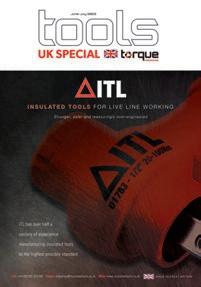
We sent out respected tools industry journalist Peter Brett to visit some of the nation’s tool makers and brands to bring back some of their expert knowledge and insights, which we’ve packaged up for you in the following pages.
We thank our advertisers for getting behind this first issue, which we hope will be the first of many – there are plenty of stories and views from the tool market to be told and bring to our readers.
We hope you like it and if you’re a tool manufacturer, retailer, brand or play a part in the industry and want to tell us about it, email us at info@torque-expo.com. For now, it’s over to Peter…
 Jonathon Harker Editor jonathon@torque-expo.com
Jonathon Harker Editor jonathon@torque-expo.com
It is our collective opinion, that news, views and clues about tools does not have enough coverage in the media – whichever channels one chooses.
We therefore aim to provide another flexible and wide-ranging channel for tool users, tool dealers and tool manufacturers to have a say, compare notes and further the interests of tool users both in the UK and Europe.
This first edition has a minor focus on tools made in the UK. Although one often hears the view that most tools are made in China and the Far East (even from people who should know better) there are a surprising number of tools still made in the UK and exported worldwide.
Although Sheffield is still a major centre of production, modern manufacturing methods have allowed tools to be made just about anywhere. It is not uncommon to see tools being made in well lit, modern, safe and ‘green’ facilities which still employ skilled production staff whose skills earn them a decent living.
What struck me when I made my first round of visits to tool makers was that every single one had an individual tale to tell, whether it was restructuring caused by the financial crisis in 2009 or dealing with changes caused by the pandemic. But what was also clear that the companies did not throw up their hands in horror, they worked hard to find solutions – national or international. Most of them succeeded and emerged from the experience wiser and stronger. I think there will always be a market for tools – from the simplest line pins to the most up-to-date portable CNC machines. Where there is a market, there is usually business to be done.
If you have a ‘tool’ story to tell, be in touch. It could form the centre of our next edition.
Peter Brett Tools Editor info@torque-expo.com04 POWER TOOL GIANT > THE STORY BEHIND STANLEY BLACK + DECKER
06 QUALITY TOOLS SINCE THE 1760s > FOOTPRINT TOOLS
08 GROUND-BREAKING POWERBREAKER TOOLS & GARDEN TOOLS > BULLDOG TOOLS
10 AWARD WINNER > DK TOOLS WINS AN INDUSTRY AWARD FOR ONE OF ITS POWER TOOLS
12 HAMMERS SUPPLIERS TO THE WORLD (BUT NOT THE GODS) > THOR HAMMERS
14 ELECTRICAL TOOL SAFETY > INSULATED TOOLS
16 AN ACQUISITIVE FAMILY TOOLS BUSINESS > NEWSOME TOOLS
18 40+ YEARS IN TOOLS > INDUSTRY STALWART SIMON BICKNELL ON TOOL MARKET CHANGES


Disclaimer
Although the utmost care is taken to ensure that information contained herein is accurate and up to date, the Publisher cannot be held responsible or in any way liable for errors or omissions during input or printing of any material supplied or contained herein. The Publisher also cannot be held liable for any claims made by advertisers or in contributions from individuals or companies submitted for inclusion within this publication. The opinions expressed are not necessarily those of the Editor or of Stag Publications Ltd.
With hundreds of years’ history, the story behind Footprint Tools is an example of how tool companies have to be agile to survive and be profitable. We took a tour around its manufacturing floor...
Sheffield is still the home of much toolmaking activity in the UK. And, yes, some of it still involves the bashing of metal at high temperatures, because that is what is needed to produce the highest quality tools, that will last the course and perform at the required level.
I suspect that ‘heating and beating’ metal was also part of the production process when the company was established in the 1760s making augers (a highly skilled process) for the woodenhulled ships of the Royal Navy.
Footprint Tools first came onto my radar about ten years ago at Cologne’s International Hardware Show where the Jewitt Brothers, Tim and Richard, had a small stand showcasing some basic tools like brick bolsters and the famous Footprint Wrench that was still showing a healthy demand in the market.
practical, efficient and do the job required. Today’s budgets are tight and the requirements for making tools demand a lot of space, energy and skill. No fripperies!
Over a mug of tea, the brothers gave a lightning overview of the history of the company. It has only been associated with the Footprint trade mark since 1948. There had also been quite a few acquisitions of related companies like the John Bull Company, makers of edge tools, and CH Jenkinson, makers of brick bolsters.
It was only in 1968 that all the Jewittowned companies were merged into the Footprint brand, and in 2009 the name Footprint Sheffield Limited was adopted.

As enlightening as it was to see just how agile tool companies have to be to survive and be profitable, the almost constant windowrattling ‘thump’ from the factory floor got my attention. I am fascinated by production processes, so donning the required ear protectors, we went to watch the real world in action.
I have been following the company’s progress since then and I was delighted when Tim Jewitt arranged a time for me to come to Sheffield and see for myself. Time to get my prejudices confirmed or shattered?
Since 2008, Footprint’s production has been based in a newer premises, the Admiral Works, at Owlerton in Sheffield. From the front of the building it would be hard to imagine the amount of space behind that is dedicated to manufacturing tools. I didn’t expect ‘modern’ at Footprint. The facilities are
A long bar, heated to the required red heat, is hauled out of the furnace by the forger and placed in the die. A swift press of the foot pedal and a floorvibrating thump later, the brick bolster, still glowing red, is passed to the next man who trims the edges and recycles the waste. It is amazing, but the forging knowledge required to produce a Footprint quality brick bolster that will retain an edge for longer and perform better than a fabricated version, is not always appreciated or acted upon. The subtle changes in steel composition and alloys need to be taken into account in the making. Tim and Footprint have this knowledge at their fingertips, and this has led to some strange bedfellows where existing forgings from other manufacturers have been reforged at the Footprint works to bring them to the required standard. The lesson may be that we should be using local companies to make things when the price differentials compared to Far East manufacture are getting less and less.

One of the advantages of the Owlerton works is that there is plenty of space to expand production. Some existing plant capacity can be moved to form more logical and economically viable production lines. Yet another example of how British manufacturers can be agile enough to move quickly to follow a market or trend.
We saw this on our factory visit where the production of line pins was concentrated in a particular work area. Footprint has identified a ready market for brick line pins and we saw them being forged, trimmed and polished in that space where big machines did the hard work while the humans put in the finishing touches. The flexibility of the space enables Footprint to manage the peaks and troughs of supply and demand. It seems that line pins by Footprint are much in demand by bricklayers throughout the world.
Being a part of Sheffield University’s Advance Manufacturing Research Centre since 2004, in partnership with Boeing, has also opened up other doors for more advanced manufacturing techniques, of which I am sure we will hear more soon.
The simple manufacture of hacking knives, another product with worldwide appeal, is another example of making a product properly, so that it stands out against the fakes and alsoran prod
// It was only in 1968 that all the Jewitt-owned companies were merged into the Footprint brand, and in 2009 the name Footprint Sheffield Limited was adopted. //A long bar, heated to the required red heat, is hauled out of the furnace and placed in the die
The forging knowledge required to produce a quality tool is not always appreciated, even covering the subtle changes in steel composition and alloys that need to be taken into account


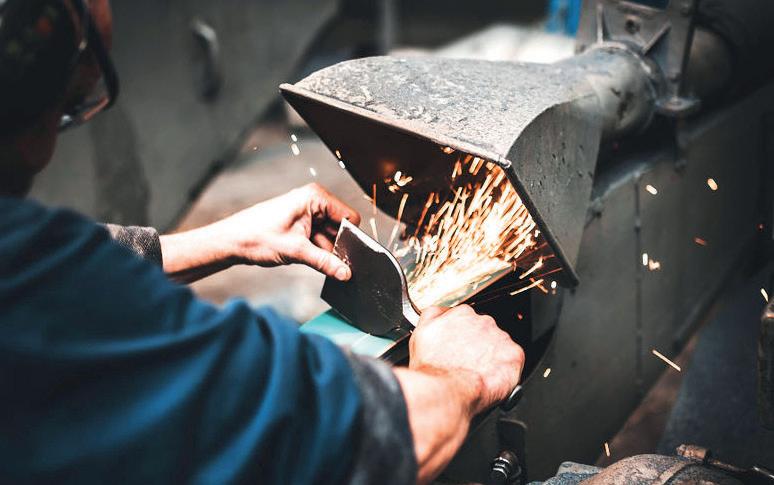
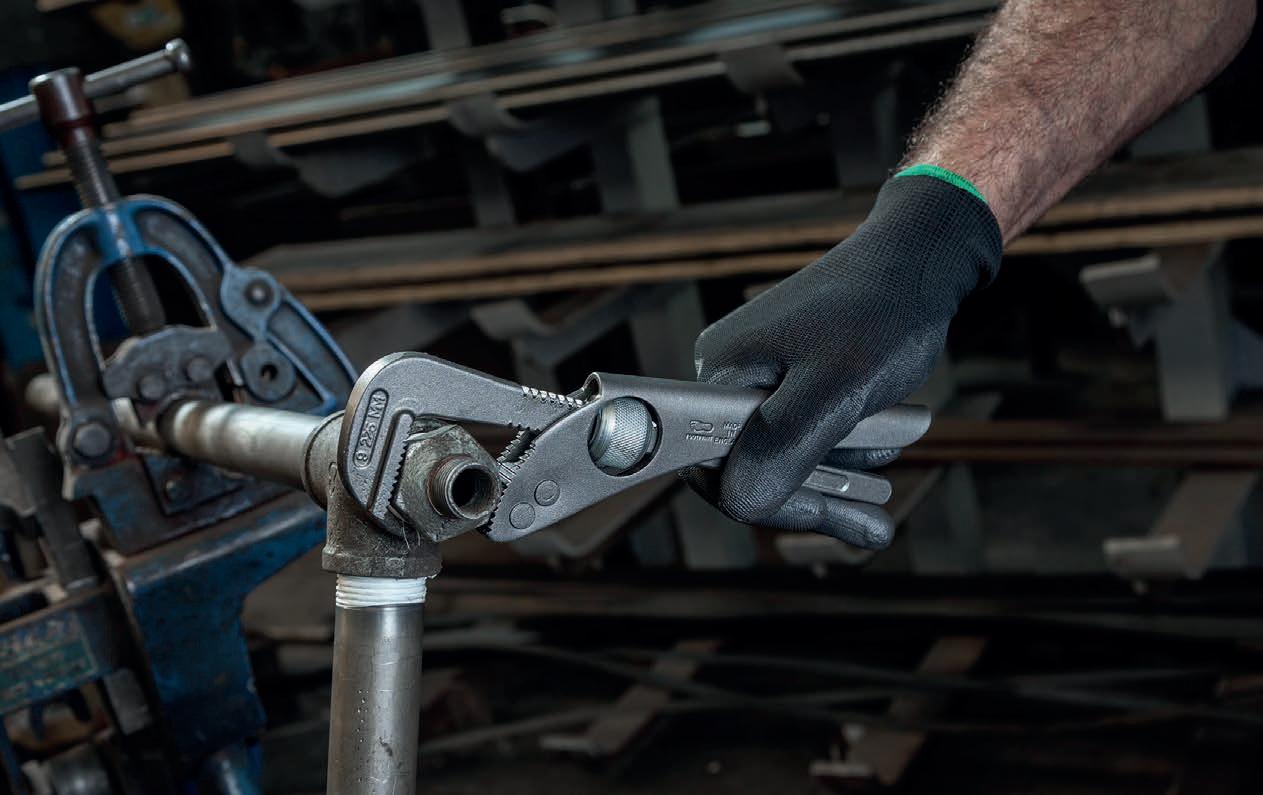
ucts that can fill the vacuums in the market. The demand for these fills a very big trolley every few months. And I am not surprised since they are still made with the riveted leather handles and sharp edge that defines a good quality hacking knife.
It also became clear in our tour of the factory that Footprint has lots of irons in the fire, so to speak, that will increase the range of products to market as well as increase profit margins.
The ‘Footprint Boys’ work very hard on all aspects of the business, reinforcing my notion that agility and flexibility must be the tenets on which our UK tool makers work to. Demand and supply are still the masters of the markets.
The Museum at Kelham Island in Sheffield is a mustvisit for people interested in the history of tools, and I can recommend the Hawley News for keeping up to date. To ensure that the Footprint brand is remembered (and maybe even plundered for inspiration in the future) the company has invited the Hawley Trust to identify and catalogue its collection of tools made under various brand names. At one point in the 1950s and 60s I am sure that almost every woodworker in Britain and the colonies
owned a Footprint tool (mine is a modest bluehandled chisel that seems to have been used for a variety of nonchisel jobs).
Tim showed us some of the boxes of stuff now being trawled through. It was partly a trip down memory lane for me because I was able identify and handle tools that I had sold when I worked in a tool supplier in my student days. In tools, as in other things, we forget our past at our peril, and the Footprint collection is a fascinating glimpse into the downs, but also the ups of tool manufacturing in Britain.
The visit to Footprint Tools is memorable for lots of things, but the standouts? Definitely the enormous thump of a forge shaping red hot metal, and the glimpses into vital parts of our history and future where specialist manufacturing will be ever more important.

www.footprint-tools.com
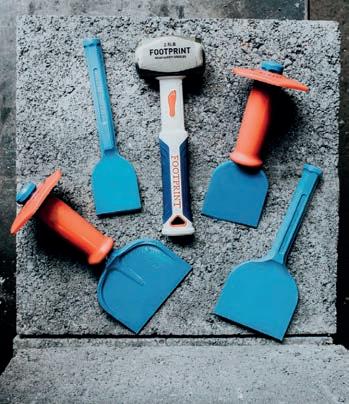
// Demand and supply are still the masters of the markets. //

Stanley Black and Decker is the world’s largest tool company. It makes an enviable range of tools and tops the polls for many who rely daily on its tools to make a living or simply drill a few holes or drive a few screws. But success, and especially continued success in the marketplace, has many facets, and also relies on management and directors to make good strategic decisions – like diversification, acquisitions and Research and Development, to name but three. We need to understand a bit more about these to build a picture of Stanley B and D as it is now.
Frederick T Stanley was born in Connecticut in 1802. One of seven children, he learned his work ethic at a young age on the family farm. By 1843 highflyer, Stanley had cofounded the Stanley Bolt Manufactory, and The Stanley Works in 1852. At the time of his death in 1883, The Stanley Works had developed into a wellknown manufacturer of hinges, planes, bolts, bits and other tools.
Stanley understood the importance of infrastructure and finance in ensuring the growth and success of his businesses. For example, in 1857, he helped design a modern waterworks to serve Hardware City, and despite much opposition from the people of New Britain, he continued to plan and promote infrastructure improvements.
Stanley also saw the growth of his personal enterprises into what was viewed as the best employers in New Britain. He was determined to transform the city into a modern manufacturing hub and his fellow citizens eventually recognised his commitment to the city. A New Britain Herald article from the 1880s wrote “He has done more for New Britain than any one [sic] here”.
By the time Stanley and Black and Decker merged in 2010 the company had already become a global supplier by the process of expanding into other countries, building factories and making other strategic decisions. Two world wars and an increasing demand for manufactured goods, tools and machines also helped to ensure a steady growth of sales for innovative and necessary basic tools.
For example, in 2005, Stanley acquired Facom, a French hand tools company. Stanley already generated 30% of its sales from outside North America, and by the time of the merger with Black & Decker five years later, that number had grown to 44%. So strategic acquisitions like Facom allowed for further growth in a diversified market.

Like Stanley, the history of Black & Decker also shows a tendency towards international expansion. Founded in 1910, the company opened an export department in 1925 and hired its first international sales representatives in 1927. Over the next halfcentury, Black & Decker continued its international expansion and distribution, either manufacturing in or exporting to more than 40 countries in Europe, South America, Africa and the Far East.
Even the fall of the Soviet Union was an opportunity – in 1991 Stanley Tools Poland was the first company to be formed in the Eastern Bloc.
The Stanley Black & Decker family of companies separately brought strengths in different areas, so when they merged, they represented a global powerhouse with sales and operations in key areas around the globe. At the same time, the company does not neglect its local brands to ensure they remain strong components of its global strategy.
// The POWERSTACK system produces more consistent power from a compact 18v battery system that is favoured by jobsite tradespeople. //

Stanley B and D continues to invest heavily in R and D and new technology. Its expansion into different product segments (like gardening) have some crossovers that can be used in a number of products. Battery technology is one of the most important of these areas, and the company is well known for its FLEXVOLT battery platform, and more lately, the POWERSTACK system that produces more consistent power from a compact 18v battery system that is favoured by jobsite tradespeople.
But with opportunities for bigger cordless technologies in the gardening and groundskeeping areas, Stanley B and D is investing heavily to compete in this growing market. I was assured that the company likes to be the leader in the race for new tech. With generous investment and R and D teams already in place it has a head start.

Stanley B and D has acquired many brands in the last 20 years. Facon, an umbrella of brands under Irwin Tools, Craftsman and LENOX are just a few. The brands cover a wide range of tool sectors but have enough brand recognition to stand alone. But at the same time, they have enough range to make end users feel that they don’t have to search outside the Stanley B and D brands to find all the tools they need for a total solution to their tool buying.
The company spends a lot of time and effort talking to its end users and feeding back opinions and findings to the R and D teams. Stanley B and D likes to be the first on the block with new products and other innovations.
Staying No 1 globally is not a simple ambition. It requires an understanding of diversity, inclusion, marketing and the environment, as well as tools. The leadership to make sense of it all and make the right strategic decisions is key too. There are many examples of misguided investment in the wrong products in the world of tools and Stanley B and D has tried hard to ensure that the management team can recognise the need for a much wider vision of the tool industry, as well as understanding the need to be a good employer, being socially responsible as well as dealing with climate issues, recycling, energy and sustainability.
So, the next time you are weighing up your next tool purchase, be you a DIYer or a professional, you may take into account all the other factors that make for a good tool, and not just the price. To coin a muchrepeated phrase – In the world of tools, we have never had it so good.
www.stanleyblackanddecker.com
// The company spends a lot of time and effort talking to its end users and feeding back opinions and findings to the R and D teams. //
With more than 100 years’ heritage, Carl Kammerling International (CKI) provides hand tools, storage, power tool accessories and security products for professional, industrial and consumer use, all with quality and innovation at heart.

CKI is known for its innovation, durability, and reliability, from trusted tool brand C.K Tools, to smart, affordable, tool storage from C.K Magma, and locks you can trust from Kasp Security. Since 1904, C.K Tools has produced high quality tools that meet the most demanding needs of trade professionals.

Tools are built to maximise efficiency and accuracy, stand the test of time, and answer the needs of professionals. C.K Tools’ HD Comfort Strike Through Screwdriver, for example, is built to a clear rationale, and has proven essential for so many. Boasting an engineer’s pattern, cellulose acetate wipe-clean handle for maximum usability and strength, HD Comfort Screwdrivers are precision engineered from chrome-plated toughened alloy steel. Designed for engineers, the HD Comfort Strike Through Screwdriver is a favourite in the automotive industry, with its striking plate helping to loosen stubborn bolts when hit with a hammer.
At CKI, there is no product without a clear rationale; each one is meticulously planned, refined, prototyped, and tested. Recently launched to huge acclaim are C.K Tools’ Rescue Sets, loved by engineers for minimising frustrating downtime. Our Damaged Hex Bolt Rescue Set removes hex fasteners with up to 100% rounded heads, while the Damaged Nut Extractor Set grips and works on fasteners with up to 85% damaged or worn corners.

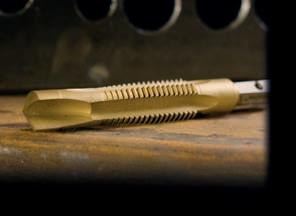



With each new product designed, developed and tested in collaboration with our panel of professional users, our ranges deliver exactly what is needed. For tool storage, durability, comfort, and considered design are key. The C.K Magma Technicians Wheeled Tool Case is stylish, lightweight, and built for longevity. Its durable chassis and wheels are suitable for all terrains, allowing effortless movement of larger toolkits, test equipment and power tools. A tough 600D polyester construction means it easily survives the rigours of everyday work, without weighing you down. Intuitive design ensures every tool has a place, stays in that place, and access is easy and convenient. What’s more, it looks smart on site.
Kasp’s 190 High Security Padlocks, with a Sold Secure Diamond rating, are among the most secure padlocks on the market, and flagship product for a brand with 40 years of experience in the security business. With hardened boron alloy steel shackle, double ball bearing locking mechanism, and a six-pin drill cylinder with anti-pick mushroom pins, they resist every kind of attack. Suitable for securing shutters, site gates, containers, and other high security applications they are made from pearl nickel plated hardened steel, giving extra strength and resistance against corrosion.
Driven by innovation, quality and durability, and developed in collaboration with trade professionals, CKI’s brands have a legacy and range to rely on.
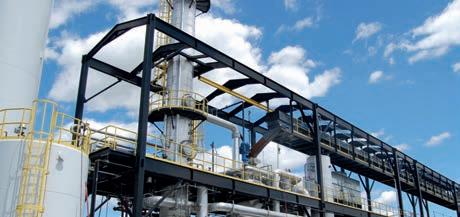



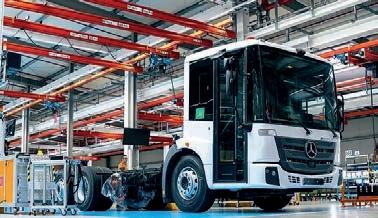
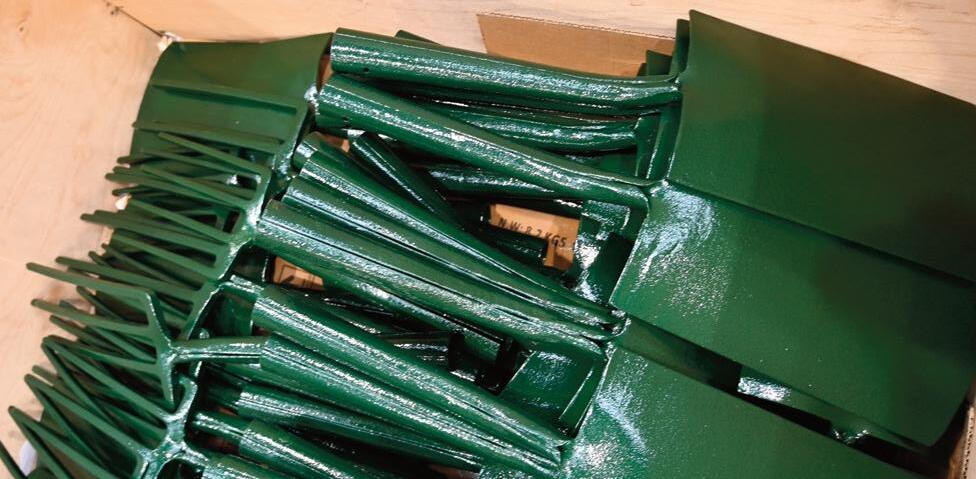
Spades are not just spades… since being taken over by Rollins, Bulldog Tools has modernised its HQ and production facilities in Wigan as well as invested in a sustained programme of development. Bulldog takes us through new products from its Powerbreaker digging tool range and its pledge to be more sustainable…
Bulldog Tools, manufacturers of highquality gardeners’ and contractors’ tools was established in 1780 and has served all the monarchs since that date. Much of Bulldog’s production still takes place in the Bulldog factory in Wigan. The tools are embedded into British history – they were issued to the British forces during WW1 where digging trenches was a required skill for soldiers, and they are still used by the forces nowadays.
I was lucky enough to secure an invitation to be shown around the Wigan factory by Dominic Elsom, Marketing Director, and Gavin Robinson, Factory Manager.
In a long 243year history there are bound to be a few ditches, not necessarily dug with your own spades. There is always a story to tell. Much has changed in the world. For some jobs, even spades are not, ‘just spades’ anymore. Modern requirements mean that, although digging is still the job, the requirements to do it successfully have become more demanding, and the economic background to production has changed beyond recognition.
We might not be talking about Bulldog Tools now if the company had not been bought by Rollins Tools in 2004. This connection has allowed for Bulldog Tools to benefit from extra investment and a sustained programme of development that has acknowledged the importance of the Bulldog brand as well as diversifying the product range sold under its undoubtably strong brand image.
Bulldog is rightly proud of the fact that its digging tools are individually forged. Spade blades are formed from a single piece of steel and forks have their tines drawn out rather than

simply welded on. The forging process, when well managed and skilfully done, makes for a much stronger tool that will measure its working life in decades rather than years.
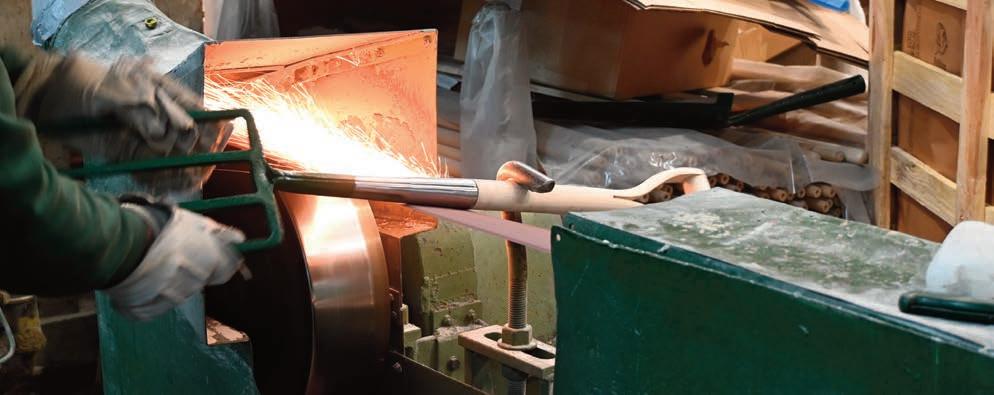
But here is the problem. Skilled forgers are not two a penny anymore (were they ever?) and Bulldog had great difficulty in hiring and training forgers from the local area. Some lasted a mere few hours on the job, and some a month or two, but it soon became clear that there was no future for British production of digging tools in Wigan.
The inevitable followed – trips to the Far East and environs were undertaken to try to find a forging company that could produce the tools to a consistent specification in the quantities needed. Eventually, a factory in India seemed to fit the bill, and after much negotiation and input, and lots of examination of steel and techniques from a Britishbased team, the factory started producing digging tools that met the required standards. And has now done so for several years, making this a very successful partnership that reflects the current realities of the toolmaking world.
// Workers have to be multi-skilled to master all the different processes they may be called upon to do. //
Forging the blades is only the start of the process. The forged blades are shipped to Wigan where they have handles individually fitted, are powder coated, polished, lacquered, labelled and wrapped in an environmentally friendly paper case ready for distribution. Bulldog Tools – British or Indian? I guess they are both, but the important thing is that we can still buy tough, robust, properly made digging tools at an affordable price. As I said above – current realities.
The old factory premises, while they look delightfully retro now, having been tidied up, were in need of an update. Using the investment from Rollins over several years, a smart, modern entrance has been created, with a couple of showrooms to highlight Bulldog and Rollins tools close by. The old factory outline and roof are still visible above the new mezzanine floors that house the meeting rooms, offices and new spaces that make a huge difference to the comfort and productivity of staff.
That still leaves a lot of the old factory floor that has been brought up to modern standards. There are various production areas for different products set up because not all products are needed throughout the year. Workers have to be multiskilled to master all the different processes they may be called upon to do.
It was in one of those spaces that I got a close up of the production of an ash YD handle. Each one done expertly by hand using the minimum of machinery, but at the same time done very efficiently. I was intrigued by the ‘spinning handle’ sanding technique that ensured a good smooth sanding over the whole handle.
Another classic is the Springbok rake – the origin of the name long since lost over its 103 year history of production. Each tine had to be bent, inserted by hand into a comb, riveted into place and then cut to length. Watching an experienced hand doing the job makes it look a lot easier than it is, but I will now regard my 40yearold Springbok rake with more respect.
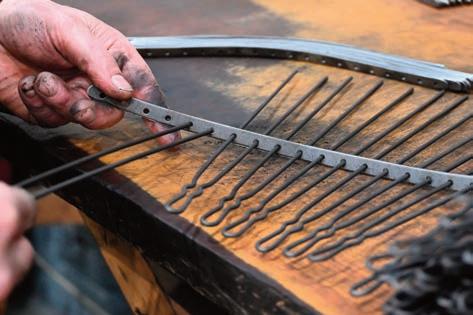
As I mentioned above, spades are not just spades. Bulldog Tools has worked hard to develop its range of Powerbreaker digging tools. Largely aimed at the rail and utilities sector, the range provides safety for workers who have to dig around electricity cables. Each insulated tool conforms to BS8020:2011. In fact, they almost always exceed the standard. Each tool is tested for conformity, certificated and engraved with a serial number so it can be traced.
Of course, there is much more to the handle of a spade that will protect a worker from a 10,000v shock. Each handle is individually treated in the manufacturing process and tested at the end of each stage so that it will conform to standard. Next time you see somebody digging near a rail line they will almost certainly be using a Bulldog Powerbreaker. Not to mention the thousands of them that are exported throughout the world.
Looking to the future where the sustainability of manufacturing will become even more important, Bulldog Tools management have been very active in pursuing greener ways of doing things. This could be simple things like replacing all lights with LEDs and timer switches, insulating where possible and so on. But there has also been a lot of thought given to production where different ways of doing things has saved energy and reduced costs. Tools are now wrapped in a strong paper sleeve for dispatch, and the use of plastic wrap on pallets is now almost obsolete.
Plastic packaging for smaller products like secateurs, is being redesigned to be wholly recyclable for example, and the sourcing of timber products like ash wood for handles has ensured that it comes from FSC sustainable sources.

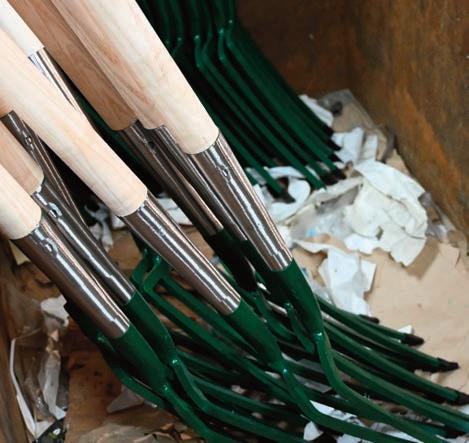
The green agenda has many aspects, but to Bulldog’s credit, it is looking openly and honestly at all the options needed for the future.
With a company like Bulldog Tools that has a very long history there is always baggage. “Fings ain’t wot they used to be” is a blinkered way of cutting out the longer view that is needed to ensure the future survival and prosperity of a business. Bulldog Tools seems to be proudly carrying on its traditions, at the same time as looking to the future with confidence.
www.bulldogtools.co.uk

Amtech’s 230V 600W Mini Circular Saw picked out by industry judges in a tough category, while the business also gained commendations in other categories…
DK Tools has been awarded Power Tool of the Year at a recent industry event. The company was also highly commended for DIY Product of the Year, as well as the Retailer Support and Marketing Initiative awards.


This scoop comes off the back of winning Lighting Product of the Year in 2020, followed by Hand Tool of the Year in 2021 and Garden Tool of the Year in 2022.
“After picking up awards in various other product categories over the past few years, the business is delighted with winning such a highly contested and crowded category,” says Val Lu, Product Manager at DK Tools. “The award has also given our New Product Development (NPD) team a huge morale boost after they overhauled the Amtech power tools range less than a year ago.”
The winning product is the Amtech 230V 600W Mini Circular Saw (stock code V6140). It has a 3step startup procedure, making it very safe to use and perfect for general DIY tasks. With a laser cutting guide and an easily adjustable cutting depth with gauge, it is accurate and easy to operate. Supplied with three 85mm blades with a maximum 26mm cutting depth, it is ideal for cutting a wide range of materials, including soft and hard woods, composite boards, flooring, wall and floor tiles, or metals and plastics. It also has an efficient dust extraction attachment to keep the work area clean and is guaranteed for two years.
You can view the product in action on the Amtech DIY YouTube channel or scan the QR code to watch.

Amtech is a DK Tools Ltd brand, and the familyowned business has been established in the home improvement industry for over 35 years. Amtech was rebranded in 2016 and selected as a ‘brand of interest’ by The Telegraph Business Club in 2019. The company was also endorsed by The Business

Magazine in 2020 for ‘operational excellence’ during the Covid pandemic. Later in 2021, DK Tools won the ‘Ecommerce Solution of the Year’ award for its trade website (dktools.com) and also became an ISO 14001accredited tool company during the same year.
The company has awardwinning products across multiple categories and the 2,000plus product portfolio covers key categories including hand tools, power tools and accessories, safety and workwear, automotive, hardware and fixings, and more.
For more information or to open a trade account, please visit dktools.com
www.dktools.com
Not a saw loser: Amtech
230V 600W Mini Circular Saw was a DIY Award winner this year
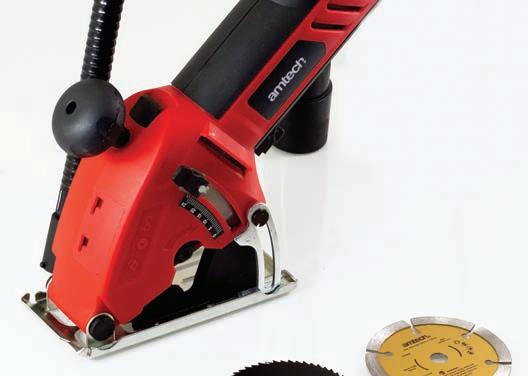
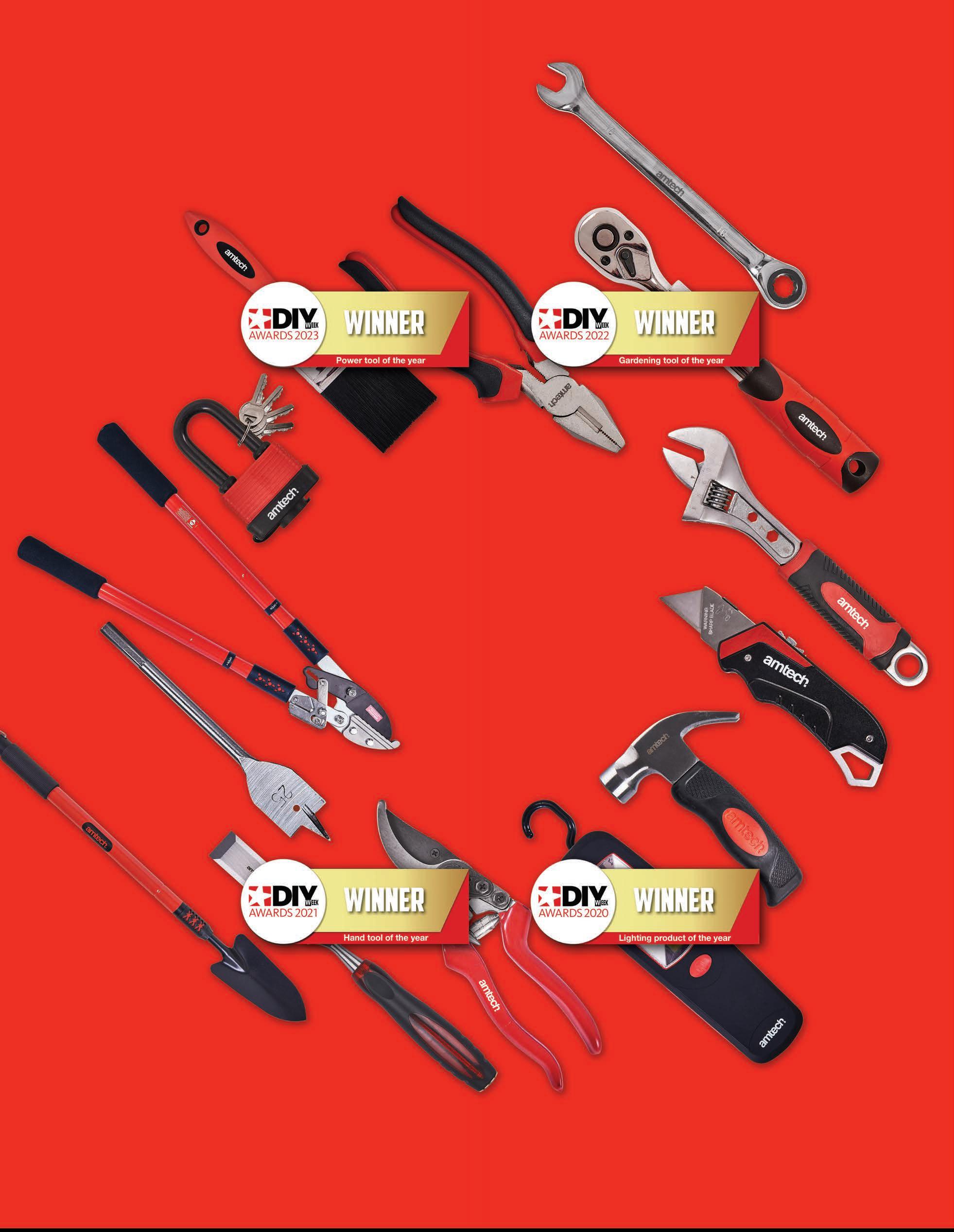

Thor Hammers may not be as old as the Nordic legend it took its name from, but is does have over a century’s experience of manufacturing and a hammer background that stretches back to the 1930s…
Thor Hammers make specialist hammers – and I think that people would be surprised at just how specialist hammers can be. My experience of a Thor Hammer is very limited – on occasional window fitting jobs, I have used a Thor nylon faced hammer that is used to gently (sometimes not so gently) tap the mitred glazing retaining strips into place. The hammer is essential – but specialised. Every window fitter needs one, which is the key point for Thor Hammers Ltd.
Based in Shirley in Greater Birmingham, Thor traces its origins to the early 1900s to two companies: Stephens Belting and Birmingham Belting, both owned by the Stephens family.
The companies made rawhide belting, but it wasn’t until the 1930s that they decided to use their experience of using rawhide to make better quality rawhide hammers than the ones they were using in the factory. Leaving out all the inevitable shuffles with marketing and company arrangements, a certain Walter Stephens was given the job of developing the manufacturing and sales of rawhide hammers. His first job was to find a suitable brand name – and what better than the mythological hammer user, Thor?
This was duly registered and Walter was soon busy developing other hammers to increase the range. A copper/rawhide hammer soon became a hit with SS Cars (which became Jaguar) that was used for loosening the wheelnut ‘spinners’ found on wire wheels. This hammer remains the biggest seller of all the Thor range to this day.
The specialist and sophisticated requirements of the armed services during WW2 ensured that Thor Hammers was kept busy churning out specialist hammers as well as developing newer variants as required.
One material – plastic – became very important with the introduction of a plasticfaced hammer postwar. The advantage was that the faces could be replaced by the users when they wore out. The British Industries Fair in the mid1940s saw many new customers from all over the world adopting Thor’s specialist hammers, and yet another premises move took place in the mid 1950s to Shirley, where it still resides in a building that authentically reflects the industrial look of the time.
The 1960s and 70s saw the development of many more specialist Thor Hammers, as well as increased market interest from literally all over the world.
As rawhide belting became obsolete it was decided to rename the company Thor Hammer Company Ltd.
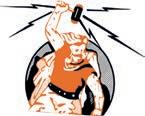
A quick rundown of the names of hammers developed from the 1970s to the 1990s will give a good idea of just how specialist the hammers became: The Dead Blow, the Split Head, the Super Plastic Mallets, Solid Copper Mallets and Solid Brass Mallets all have specialist applications and differences in manufacture that Thor has perfected and continues to sell to over 80 countries worldwide. And there are many more variants in the range.
Thor hammers’ ranges developed and became ever more specialised, with products like the Dead Blow, the Split Head and Solid Brass Mallets

// Plastic – became very important with the introduction of a plastic-faced hammer post-war. //
Thor Hammers remains a familyowned company with a loyal workforce and a constant eye on the need for improving manufacture, developing new products and marketing them in a highly competitive atmosphere. All that from having the nous to think outside the box when it came to rawhide a hundred years ago. And I guess nous continues to be a requirement for a successful business.

The Factory Floor

I reckon that if I took a retired Thor employee from the 1980s and put them back on the current Thor shopfloor it would not take very long before they were fully productive. Over the years, production of hammers has been finely honed in terms of materials, processes and workstations. So, although the factory floor still bears the marks of previous decades, it is probably as efficient as a group of time and motion consultants could come up with.
Machinery is used wherever possible – it is largely custommade and does the job, so the old adage ‘if it ain’t broke don’t fix it’ applies.

I was shown the manufacturing stages of the most popular rawhide/copper hammer – from the rolling of the rawhide faces, through the turning of the handles, the preparation of the copper face and the final assembly by pressing it all together and the final fettling and finishing. I was even given a customised one with my name on it. Thanks very much!
It seems that laser customisation is a ‘thing’ in the USA and Thor is willing to add the value and boost to sales if that is what the customer wants.
There are still medium and longterm targets that the company is tackling. Along with the rest of us, energy efficiency is a significant challenge to be solved. Steps are in place and will slowly transform the look of the old building, from the inside at least. Lighting, insulation and security are currently part of the wider energy strategy.
It seems to me that the common theme for much of tool manufacture in the UK that businesses like Thor need to keep looking for opportunities to expand, modernise and increase turnover. Companies with long histories should remember their history and exploit the knowledge that experience brings, while not being too tied down by the workings of ‘traditions’ that prevent change and modernisation.
www.thorhammer.com
// Thor Hammers remains a family-owned company with a loyal workforce.
Over the years, production processes have been finely honed, with energy efficiency a challenge still being solvedHammer home: Thor's manufacturing floor has produced hammers since the 1930s
The industry has been cushioned against the worst for many years, due to a strong pound and the emergence of the Far East. A couple of years ago a customer of Newsome Tools was relocating premises and found an invoice from the early 1980s. We were all surprised to see how little prices had actually increased in the 40 years, particularly in the case of abrasives.
Newsome Tools recently picked up two awards for our multipurpose outdoor gardening survival knife at the annual DIY Week luncheon and was shortlisted for two other awards. This followed similar success last year when I was presented with a special industry Personality of the Year award to mark 50 years in the business. We also won an award for our unique ecofriendly paint brush range made with bamboo handles.
Now over five decades old and under the management of Jack’s son, Martin Newsome, Newsome Tools has moved from its original premises – a single garage – to a custom designed facility in Sheffield.
Along with larger premises has come a vastly expanded product range that is carefully sourced from many suppliers and carefully differentiated at various end users. By diversifying and expanding, the company now exports and manages Quality Control for other companies, and yet still manages to supply its local customers via its local Sales Reps.
Martin says that that Newsome Tools is a ‘people business’ –and the staff retention numbers and the list of loyal clients confirms this. And third generation, Martin’s son, Jonathan has worked in the company for 20 years now. The future in business always beckons, so what better way to look at it than allow Martin a chance to tell us about how he perceives it.
Dear readers, here is some of my thinking & perspective on the market, the future, challenges and opportunities.
Newsome Tools remains committed to the market working closely with our customers – giving them the best possible service through a team of staff, many of which have stayed with Newsome Tools for their whole working life.


I have made three acquisitions in the last seven years, the most notable being The English Chain Company, which has a different product range but shares similar values and market.
For the last 30 of our 55 years we have continued to export throughout the world, in addition to sourcing for UK customers who don’t want to import themselves. We deliver their requirements, through our longestablished connections – a finished product that is inclusive of all costs and delivered Pound Sterling prices. This activity has enabled us to punch above our weight in terms of buying power.
Inflation: Clearly this has been a challenging period in our industry – however with the falling costs of shipping, a strengthening pound and energy prices peaked, or at least showing respite for the summer – I believe the worst is over. But we will have underlying inflation for some time, albeit at a much lower rate.
As a company we are not only committed to our customers and staff, but also to the wider world. Newsome Tools has always tried to put something back into society, and in the last 12 months have supported charitable endeavours at a school in Sierra Leone, Ukraine and here in Sheffield at the St Wilfrid’s Centre. The appreciation received is very humbling and in itself, very rewarding.
I find that end users are very different from the ones of 50 years ago. The requirement for quality, reliability, customer service and product availability has never diminished. The fact is the bar will continue to be raised with this demanding user group. While there is a negative argument that, there is a generation of home renters, who are not buying their first home, and therefore tools for DIY projects, until their mid 30s. The flip side is that the newlyretired, affluent and energetic youngatheart older people are keen to embrace DIY, woodworking and car maintenance. They have time on their hands and money to buy the best. This along with the demand for greater housebuilding will ensure the future of our industry.
I remain as always, an optimist looking forward to that future.
www.newsometools.com
Established in 1967 by Jack Newsome, Newsome Tools continues to thrive as a tool supplier, initially just in the UK, but now also to other countries too.
Simon Bicknell has worked in the tool industry for almost half a century, including a significant spell at huge tool player Toolbank. We sat him down for his views on how the industry has changed over the past 40-plus years and speculates on the future…
“When I first joined Toolbank in 1986 I was set to Sheffield with a colleague by John Twallin who was a great advocate of British manufacturing. We literally spent all week visiting factories to learn about manufacturing processes and the key features and benefits of the various products involved. Having spent the first seven years of my career at Sandvik, some of the manufacturing was a bit of a shock as it was very traditional and not as modern as the highly automated plants in Sweden. I think it’s only Footprint who we visited that still manufacture there.
Later that year we developed a marketing campaign commonly known as “XMS” by many in the trade and I recently found the original leaflet which included several British brands that are now just distant memories e.g. Rabone, Spiralux, Cintride, Taymar and Danish cable reels from JoJo.
In the early days, if products sold particularly well during the campaign I could call the relevant suppliers and with some overtime they would be able to supply substantial extra quantities within a couple of weeks. By the 2020s we had to order millions of pounds of stock a year ahead with virtually no chance of any reorders.

“I am pleased to have learnt about the Made in Britain project (through my involvement with Thor Hammer) and that has been a real source of encouragement to understand some of the great manufacturing there is in UK with more than 2,000 companies involved. It seems that the difference in true costs has narrowed recently and the greater flexibility of local suppliers combined with the significant environmental benefits will help British manufacturers.
Product provenance is going to be more of an issue as we all pay more attention to the source and ethics involved in the supply chain.
I heard a brilliant idea recently that products could be marked with a kind a traffic light system (similar to food ingredients) that highlighted the product (ESG) provenance including elements such as distance travelled, ethical employment, sustainability, raw materials and recycling. Much of this will be improved by local manufacturing.
We already have some great British brands supplying tools and associated products e.g. Footprint, Thor, Walsall Wheelbarrows, Monument, Bulldog and Red Gorilla.
There was a period in the 1990s and 2000s where we all thought the only way to survive was to source products from cheaper (mainly Asia/Far East) sources but the inevitable improvement in social standards and thus costs has reduced the cost differences in many instances making a return to UK and European manufacturing more feasible.

Just in Time (JIT) supply was a big trend but combined with long distance sourcing it means someone has to hold a huge amount of stock. It can seem easy to place the first bulk order with a longdistance supplier, but many companies have struggled thereafter as sensible stock management and long lead times are not easy to combine.
Local supply combined with modern technology and communications will undoubtedly make it easier and beneficial to manufacture nearer to home.
I have worked in the industry for over 44 years as a manufacturer, distributor and retailer including a spell in Australia and have been lucky to learn from some great people and organisations. New technologies, modern methods of construction and manufacturing as well as the aforementioned focus on the environment mean that we will need to develop some different products. There will always be a huge requirement for tools –virtually everything has to be manufactured, repaired, improved, secured, measured, fixed, painted, lubricated, fixed or powered at some point.”
As told to Peter Brett…
// In the early days, if products sold particularly well, I could call the suppliers and with some overtime they would be able to supply substantial extra quantities in two weeks. //
Asmall industrial estate in East Grinstead, West Sussex, seems like an unlikely place to find a company making insulated tools for a worldwide market. But that is exactly where Insulated Tools Ltd is based and from where its ambitions are being realised.
ITL has been going for over 50 years – but has survived various changes in ownership and leadership styles, as well as having to deal with all the commercial changes that are part of running a modern business.
The management team is multitalented, with various expertise areas at their fingertips. Who would have thought that Kimberly Clark and ITL had anything in common in terms of skills needed to run them? But I am assured by Chris Pincott, Sales and Marketing Manager, (exKimberly Clark) that they do.
The team of seven has Yvonne Wardle as CFO, Jeff Cobb as COO, Adam Whitaker as FD, David Matchett as QC and Legal/Tech Manager, Mark Wardle, Sales, Robert Seymour as Design Engineer and Chris Pincott as mentioned.
This team runs everything from the daily interventions needed when running a highly regulated and safety conscious manufacturing facility to delivering sometimes large batches of tools to, literally, all over the world.
The next question is why are companies and utilities worldwide knocking at the door of ITL in East Grinstead? A small part of the answer is that electrical regulations for installation and wiring are quite tough, and in order to be able to ensure the safety of their workers and meet certifications, companies need to invest in the tools that workers can trust. There are other companies that make insulated tools and the majority produce perfectly good tools. But ITL has a couple of extras up their sleeve that makes its tools just that little bit more desirable, longer lasting, harder wearing and safer. All the tools are tested to more than comply to the demanding IEC 60900. This also includes Category ‘C’ compliance at temperatures from 70 C to 40 C for extreme environment use.
Mark Wardle was showing me the insulation on a simple spanner, when he suddenly threw it to the concrete floor and bashed it several times with an insulated adjustable spanner. That is not the normal way to treat insulated tools because their insulation can be compromised. However, when I examined the tools it was clear that the insulation was all still intact apart from a couple of minor blemishes. If that were a test that other brands of insulated tools had to endure, there would definitely be a few failures.
The demo above is clearly meant to show that ITL does things differently and can claim to be a standard setter on the insulation front. It starts at sourcing. Only the best components are sourced from reputable factories and when they arrive, they are rigorously batch tested against the ISO and BSI standards for hardness and torque application for example.
ITL’s unique area of expertise is the moulding of the insulated parts of the bare tools and applying them in such a way as to ensure that the insulation won’t come off or be easily damaged by hard use and the usual site accidents that all tools suffer.

ITL uses its own formulation of a tough nylon thermoplastic and very carefully designed moulds to create the various forms of insulation on everything from a simple screwdriver to cutter handles. The design on all tools ensures that insulation cannot be pulled off since it is so closely moulded to the handles. Not as easy as it sounds – the moulds are complicated and expensive to make and are thus a considerable intellectual property for ITL.
As the range of tools increases, the R&D at ITL is constantly designing and redesigning the moulds needed – largely done by inhouse engineer, Robert Seymour, to ensure that the relevant standards are met and upheld. In the insulation business second chances are pretty hard to come by.
Mark was very keen to stress that the investment made by the company in supporting Robert’s university education – he
With electrical regulations for installation and wiring (rightly) quite stringent, companies need to invest in tools that workers can depend upon…
ITL is keen to ensure end users get the tools they want individually or as part of a custom set


achieved a first class degree – has been an allround success for him and the business. British graduates, British highskilled jobs? You can almost see the newspaper headlines announcing success for once.
Testing starts at the beginning of manufacturing –random spot checks are done on all batches of tools and materials throughout the manufacturing process via the ISO 9001 auditing programme.
In short, the QC at ITL is very rigorous. Once manufactured, all the tools are tested to comply to the demanding IEC 60900 before being deemed ready to be packaged up and despatched. In truth, ITL’s processes have been shown time and again to exceed the required standards by some distance.
I saw a screwdriver subjected to the threeminute long 10,000v underwater test. All the insulated tools are subjected to this test so no duds ever reach the packaging stage.
ITL is keen to ensure that end users can get the tools they want individually or as part of a custom put together set. Newish, are the British designed and made torque wrenches with cleverly designed sockets that actually put a break between the user and the fastener. Torque wrenches are becoming more popular since many installations now demand torqued fasteners as standard to comply with regulations. These pair with the socket sets that can be custom built and set into a carry case with their own foam backings. But there are also some quite quirky things like little mirrors with insulated handles that can be used to look into small spaces without the user having to risk putting fingers into the space.
This investment in homegrown talent, manufacturing and products, firmly places ITL in the British Manufacturer category. A manufacturer that does not rely on overseas suppliers and keeps a wide range of stock to meet orders as they arrive. As Mark says: “If you haven’t got it, you can’t sell it”.


The comprehensive nature of the catalogue will tell endusers that ITL is a company that knows its business and strives for the highest standards of electrical tool safety. And all in East Grinstead! Just shows that you can’t take your prejudices for granted these days.
www.insulatedtools.co.uk

GENERAL UTILITY HEAVY UTILITY
HEATWORX UTILITY
HEATWORX REINFORCED
LIMITLESS LEATHER MIG WELDER
WORKFORCE
WRENCHWORX
COMMAND UTILITYYELLOW
COMMAND UTILITYORANGE
COMMAND PRO COMMAND GRIP
FASTENERCOMPLEXD1

CRADLEYBUSINESSPARK
OVERENDRD.,CRADLEYHEATH
WESTMIDLANDSB647DW
UK@IRONCLAD.COM